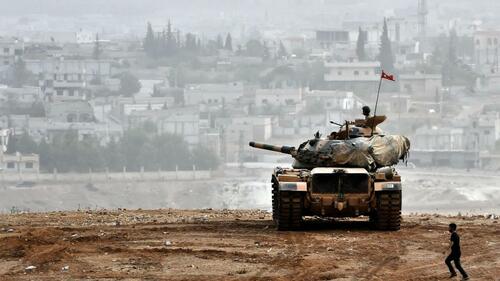The Turkish-backed Syrian National Army (SNA) announced the start of an operation against the Kurdish-led Syrian Democratic Forces (SDF) in the northern Syrian town of Kobani (Ayn al-Arab) on December 17.
The announcement came in the midst of a build-up of Turkish troops on the Syrian border in preparation for a possible invasion alongside its proxies in the SNA.

Al Mayadeen's correspondent stated that "Turkiye wants a security belt 30 kilometers wide on the border with Syria," stressing that it "is close to achieving its goal."
The Turkish military has built a concrete barrier between Kobani and the Turkey border, while Turkish warplanes can be seen flying above the city.
US media has also reported that Turkey is building up its forces along the border in preparation for a possible invasion. The Wall Street Journal (WSJ) reported that according to one US official, "A Turkish cross-border operation could be imminent."
The WSJ adds that SNA fighters and Turkish uniformed commandos and artillery in large numbers are now concentrated near Kobani, a Kurdish-majority city in Syria on the northern border with Turkey.
Turkey began building up its forces near the border two weeks ago as militants from Hayat Tahrir al-Sham (HTS), a UN-designated terror group, toppled the government of Syrian president Bashar al-Assad and occupied the capital, Damascus.
Kurdish forces under the People's Protection Units (YPG) began taking control of Kurdish-majority areas in Syria in 2012, with the outbreak of war in 2011. Turkey has sought to prevent Kurds from forming contiguous regions in areas of Syria on its southern border, stretching from Afrin in the northwest to Kobani in the north center and to Hasaka in the northeast.
Turkey first supported ISIS and then sent its own forces to invade northern Syria multiple times to prevent such a Kurdish region from being established.
The US military partnered with the YPG to create the Syrian Democratic Forces (SDF) in 2015. The US and SDF occupied land outside of traditional Kurdish control, including Sunni Arab areas containing Syria's oil fields and wheat-producing regions. The US has been trying to keep Syria partitioned, under sanctions, and unable to rebuild since the war ended in 2019.
US forces back in Kobane to monitor Turkish-backed SNA and US-backed SDF in northern Syria. This is one area that could become a new flashpoint. Turkiye wants to connect enclaves it has along the border, and Kobane (circled in map) sits in between. pic.twitter.com/9RB37Q550X pic.twitter.com/o7rGeDK3qE
— Umar Farooq (@UmarFarooq_) December 15, 2024
Kurdish official Ilham Ahmed urged President-elect Donald Trump to prevent a new Turkish invasion. Turkey's goal is to "establish de facto control over [Kurdish] land before [Donald Trump] take[s] office, forcing [the US] to engage with them as rulers of [Kurdish] territory," Ahmed wrote to Trump in a letter viewed by the WSJ. "If Turkey proceeds with its invasion, the consequences will be catastrophic.”
A spokesman for Turkiye's embassy in Washington did not immediately respond to the WSJ's requests for comment.
The Turkish-backed Syrian National Army (SNA) announced the start of an operation against the Kurdish-led Syrian Democratic Forces (SDF) in the northern Syrian town of Kobani (Ayn al-Arab) on December 17.
The announcement came in the midst of a build-up of Turkish troops on the Syrian border in preparation for a possible invasion alongside its proxies in the SNA.

Al Mayadeen's correspondent stated that "Turkiye wants a security belt 30 kilometers wide on the border with Syria," stressing that it "is close to achieving its goal."
The Turkish military has built a concrete barrier between Kobani and the Turkey border, while Turkish warplanes can be seen flying above the city.
US media has also reported that Turkey is building up its forces along the border in preparation for a possible invasion. The Wall Street Journal (WSJ) reported that according to one US official, "A Turkish cross-border operation could be imminent."
The WSJ adds that SNA fighters and Turkish uniformed commandos and artillery in large numbers are now concentrated near Kobani, a Kurdish-majority city in Syria on the northern border with Turkey.
Turkey began building up its forces near the border two weeks ago as militants from Hayat Tahrir al-Sham (HTS), a UN-designated terror group, toppled the government of Syrian president Bashar al-Assad and occupied the capital, Damascus.
Kurdish forces under the People's Protection Units (YPG) began taking control of Kurdish-majority areas in Syria in 2012, with the outbreak of war in 2011. Turkey has sought to prevent Kurds from forming contiguous regions in areas of Syria on its southern border, stretching from Afrin in the northwest to Kobani in the north center and to Hasaka in the northeast.
Turkey first supported ISIS and then sent its own forces to invade northern Syria multiple times to prevent such a Kurdish region from being established.
The US military partnered with the YPG to create the Syrian Democratic Forces (SDF) in 2015. The US and SDF occupied land outside of traditional Kurdish control, including Sunni Arab areas containing Syria's oil fields and wheat-producing regions. The US has been trying to keep Syria partitioned, under sanctions, and unable to rebuild since the war ended in 2019.
US forces back in Kobane to monitor Turkish-backed SNA and US-backed SDF in northern Syria. This is one area that could become a new flashpoint. Turkiye wants to connect enclaves it has along the border, and Kobane (circled in map) sits in between. pic.twitter.com/9RB37Q550X pic.twitter.com/o7rGeDK3qE
— Umar Farooq (@UmarFarooq_) December 15, 2024
Kurdish official Ilham Ahmed urged President-elect Donald Trump to prevent a new Turkish invasion. Turkey's goal is to "establish de facto control over [Kurdish] land before [Donald Trump] take[s] office, forcing [the US] to engage with them as rulers of [Kurdish] territory," Ahmed wrote to Trump in a letter viewed by the WSJ. "If Turkey proceeds with its invasion, the consequences will be catastrophic.”
A spokesman for Turkiye's embassy in Washington did not immediately respond to the WSJ's requests for comment.
